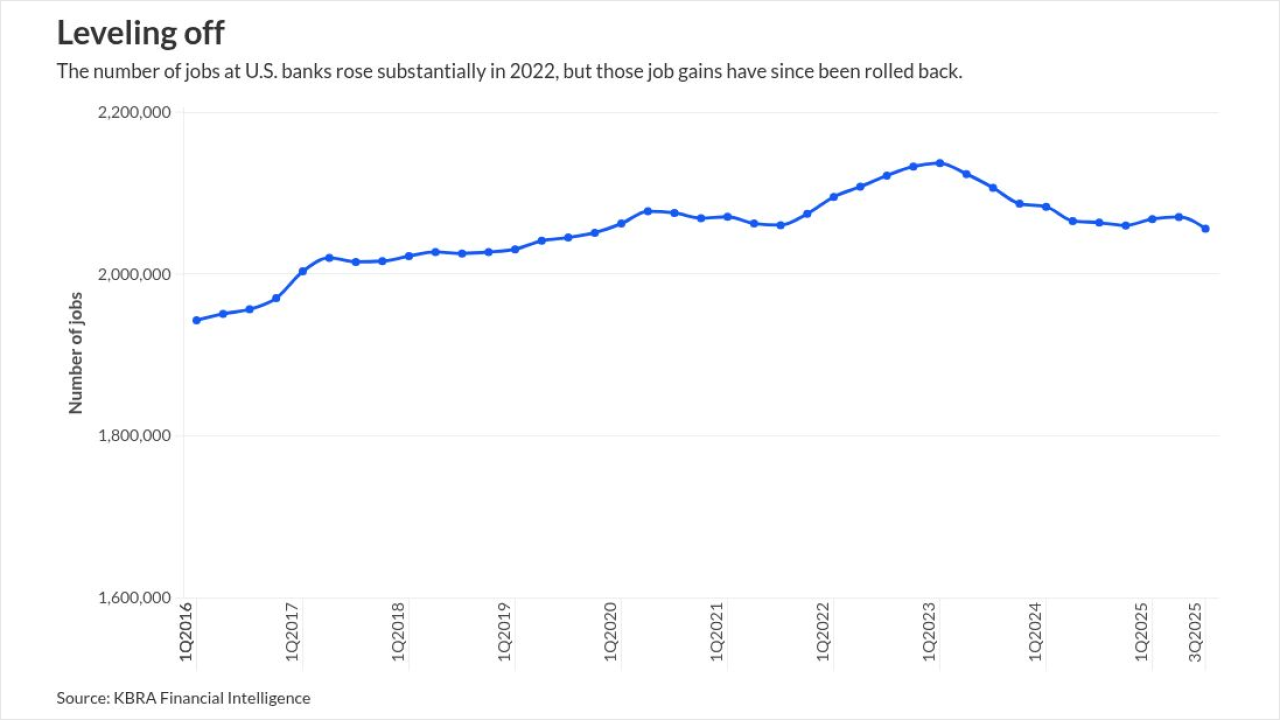
Agentic AI is a term for artificial intelligence systems capable of making autonomous decisions and taking actions with minimal human oversight. In this case,
This deployment comes amid steadily increasing adoption of advanced AI by banks, especially the largest ones. For instance, Goldman Sachs
"All banks will aspire to have this capability to increase productivity, which has been the desire for the past 30 years of development tools, so agentic is the next step change," said John Ratzan, senior managing director at Accenture.
A recent
Sumeet Chabria, CEO and founder of consultancy ThoughtLinks, which works with several large banks, said many banks are debating whether they should be deploying AI agents as assistants to human beings or co-workers to humans, that collaborate with human beings and do some things autonomously.
"A lot of banks are thinking about the framing of this," he said. "Some are only talking about it in terms of not replacing employees, but providing assistants to employees. But others are talking about the concept of digital workers, which are autonomous. They have some level of intelligence. They can sense, perceive the world. They can carry out a task. They are adaptive." Each version brings a need for security, management and guardrails, he said.
Citi's journey to agentic AI
About a year ago,
"We still very much believe in GitHub Copilot,"
Cognition's Devin agentic AI software, the software the bank is just starting to provide to its developers, is more autonomous, he said.
"You can give the agentic AI a task, and the agentic AI will execute that task for you, so it can act as more of a proactive partner to a developer," Griffiths said.
To start with,
"
In a typical use case today, a
Not a replacement for human developers
A human developer remains in charge of all Devin's tasks at
"We're certainly not allowing any kind of deployment of code by the agents," Griffiths said. "All the agents are doing is producing artifacts that then are given to the developer." The suggested changes go through automated testing and human review before the human developer accepts them.
French bank BNP Paribas is launching a U.K. fintech incubator that will host generative AI startups that have developed applications for banks.
Another task for Devin is rewriting software from one programming language to another. It can also help patch software when vendors issue updates.
"It's also really good at doing things like writing documentation and creating tests," Griffiths said. "It's not at the point where you would want to ask the agent to implement a very complicated feature from start to finish. We may get there with the technology in time, but today, I wouldn't recommend anyone to do that. We focus on the simple, repeatable tasks, which it can do at our scale. It's really beneficial to have something to be able to take care of all that work for us."
The Devin agents are trained with
"So when they decide what to do, they always do it in a way that is compliant and what we would want them to do," Griffiths said. "So we have as an important part of our deployment, the knowledge base that we put up to help guide the activities of the developer. We absolutely aren't looking for AI agents to get creative in terms of bringing in new technology to
As has been
Developers that regularly use the GitHub Copilot coding assistant get 5% to 15% greater productivity, Griffiths estimated. "But what we've seen with the agentic approach, for certain kinds of tasks, is you can get anywhere from twice as fast to 20 times as fast for a given task," he said.
Devin is not replacing any human developers yet, Griffiths said.
"It's nowhere near that level yet," he said. "We will still need the experts, our really great developers, to do that. But we do see that agentic AI is a good fit to do all of the administrative boilerplate kind of work, which frees up our developers to work on the higher value stuff. Right now, you've got to have a pretty clear idea of the kind of work you want to give it, and if that work is a good fit, it's very efficient at completing it."
Rather than reduce the developer workforce, Griffiths expects agentic AI will enable the developers to do more work.
Ratzan points out that many banks have a backlog of developer work to get through. "So first, it is about clearing the backlog, then it is about enhanced productivity that ultimately shrinks the window between idea and implementation," he said.
Another benefit to agentic AI is that it can help the bank simplify, modernize and standardize applications, he said.
"That in turn makes us more agile, because it's easier to make changes to a simpler platform," he said. "So it becomes a virtuous circle."
And AI agents produce consistent results. "When things are more consistent, they're simpler to manage, they're more cost effective to manage," Griffiths said. "It's absolutely the case that an AI agent is going to give you a consistent result every time, whereas you can't guarantee that 100 developers are going to give you the same result every time."
When patching software, for instance, "I don't want creativity," Griffiths said. "I want it done the same every time. I want the same documentation written about it."
Some tech experts expect companies to have to
"I'm very wary of over-anthropomorphizing AI agents," Griffiths said. "They're not people, they're not employees, they're technology systems. They need technology controls. They need entitlements, they need identity, they need security. You need quality checks, you need automated testing. Having unconstrained agents deployed and leaving people guessing about what they're going to do would be a worrisome situation to be in, and we would avoid that."






